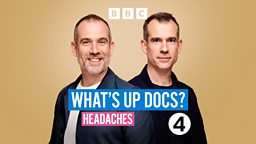What can you do about your headaches?
Do you get debilitating headaches which stop you functioning or being able to focus? Are you worried it might be a sign of something serious? Headaches are a common experience but how many of us can identify what is really causing them?
There are some simple checks we can do to understand why we get them and what we can do about them.
In their What's Up Docs? podcast, Drs Chris and Xand van Tulleken explore the causes and cures of everyday headaches.

Headaches are “the so-called invisible illness”, says GP and senior doctor at the National Migraine Centre, Katy Munro.
Types of headache
“Primary headaches are where the headache itself is the problem and that includes migraine and cluster headaches and then there are the secondary headaches which may be a bit more serious so there’s a lot of other reasons people get headaches as a symptom,” says Katy. “People need to ask themselves why they are getting these headaches.”
Incredibly there are hundreds of classifications of headache, with different causes and symptoms, so how do we know what we’ve actually got?
Here are five tips to help identify your type of headache and what to do about it…
1. Get the diagnosis right
Identifying your symptoms and recognizing how you behave during a bout of headaches or a migraine attack can help diagnose what kind of headache you have.
• If you have a migraine attack, it may hurt when you move, you might feel queasy or be sensitive to noise or light. Keep in mind that three times as many women as men have migraines.
• Cluster headaches, which typically occur on one side of the head, are less common and are so excruciatingly painful they can result in more extreme behaviours such as banging your head to distract from the pain.
• A tension headache is milder and will respond well to over-the counter medication.
• A cervicogenic headache is triggered by neck and shoulder pain, but a migraine attack can also trigger pain in the neck and shoulders, so if you have these symptoms speak to a healthcare professional to help you identify the true cause.
2. Recognize symptoms which have more serious causes
There is a common fear that a headache might indicate a brain tumour, but only about 1% of brain tumours give headache as the sole symptom. However there are some red flags which might indicate your headache is a symptom of more serious underlying health conditions. If you have any of these symptoms, see a doctor:
• If you have fever with your headache.
• If you have or have had a malignant tumour, like a breast cancer or prostate cancer and you start getting headaches.
• If you are over 50 and you start getting headaches sometimes accompanied by tenderness around your temples, that may be a sign of giant cell arteritis which is an inflammation of the arteries in your scalp.
• If you are pregnant or have just had a baby and you start to have new headaches you should seek urgent medical advice.
• If you have your first or worst headache, seek help, as it could be a sign of an underlying serious condition.
• And if you get a headache which comes on suddenly and feels as if you've been hit on the back of the head with a baseball bat. Called a thunderclap headache, it could be the result of a subarachnoid haemorrhage, so go to casualty and get it checked out properly.

3. Keep a headache diary
To identify the reasons for a headache, it can be useful to create a simple diary to help you recognize patterns of when they occur, noting down stress, light glare, weather changes, food and drink intake.
If you are a woman, make a note of your menstrual cycle as many women who are menstruating or are perimenopausal can get migraines.
Try scoring the headache from 1 to 10 in terms of its impact, note the days when you have no symptoms, and make a note of any medications taken. All these will be useful indicators for your doctor.
4. Make lifestyle changes
The good news is that lifestyle changes can help mitigate headaches. Focus on improving your diet by incorporating foods like beans, grains and greens, alongside healthy fats and protein derived from plant oils. And ensure you eat regularly.

Some people also find cutting out dairy, gluten, cheese, caffeine or chocolate can affect how regularly they get headaches or migraine attacks. Alcohol can trigger migraines or cluster headaches.
It sounds obvious but managing your stress levels and getting a restful night’s sleep will help you with stress-related headaches. Exercise regularly, but keep in mind that it can be a trigger if you suffer from migraines.
5. Choose the right medication
Over the last few years scientists have identified certain neurochemicals in the brain that are higher in particular types of headaches. Medications have been developed to block these neurochemicals and reduce headaches so find out from your doctor whether they might help you.
Try over the counter painkillers. If the headache is accompanied by dizziness or nausea, anti-nausea tablets can help. Do not take codeine which is very addictive and isn’t appropriate for headaches or migraines because it can actually have the opposite effect and trigger chronic pain. As an effective medication for migraines, the GP may offer you a triptan.
Finally, Katy Munro says, “You have to go through the process of finding the right recipe for yourself. I really think we should be asking, why am I getting these headaches? Because then you are empowered to go and find the right help.”
Further advice is available from these websites to help you identify your symptoms and causes:
• • •









